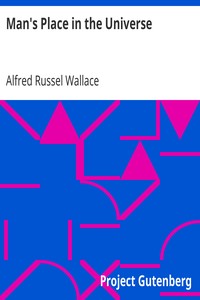Man's Place in the Universe by Alfred Russel Wallace
"Man's Place in the Universe" by Alfred Russel Wallace is a scientific publication written in the late 19th century. The work explores the implications of scientific research regarding the potential for life beyond Earth, specifically addressing the question of whether our planet is the only abode of organic life in the vast universe. Wallace aims to analyze astronomical, physical, and biological evidence, drawing connections between these fields to understand humankind's unique position
within the cosmos. The opening of the book sets a foundation for Wallace's exploration by introducing the historical context of humanity's thoughts on the universe and our place within it. He reflects on early astronomical ideas, notably those held by ancient civilizations, who viewed Earth as the central hub of existence and the heavenly bodies as subordinate to it. Gradually, Wallace ushers readers into modern astronomical perspectives, highlighting the shift in understanding that arose following the discoveries of renowned scientists like Copernicus and Kepler. He emphasizes the rarity of concrete evidence supporting the existence of life on other planets, positing instead that the conditions necessary for life are likely unique to Earth. This opening serves as a prelude to a comprehensive discourse that seeks to systematically evaluate existing theories and build a case for the possibility that Earth is singular in its capacity for supporting life. (This is an automatically generated summary.)
Read now or download (free!)
| Choose how to read this book | Url | Size | ||||
|---|---|---|---|---|---|---|
| Read online (web) | https://www.gutenberg.org/ebooks/39928.html.images | 631 kB | ||||
| EPUB3 (E-readers incl. Send-to-Kindle) | https://www.gutenberg.org/ebooks/39928.epub3.images | 3.4 MB | ||||
| EPUB (older E-readers) | https://www.gutenberg.org/ebooks/39928.epub.images | 3.4 MB | ||||
| EPUB (no images, older E-readers) | https://www.gutenberg.org/ebooks/39928.epub.noimages | 295 kB | ||||
| Kindle | https://www.gutenberg.org/ebooks/39928.kf8.images | 4.7 MB | ||||
| older Kindles | https://www.gutenberg.org/ebooks/39928.kindle.images | 4.7 MB | ||||
| Plain Text UTF-8 | https://www.gutenberg.org/ebooks/39928.txt.utf-8 | 549 kB | ||||
| Download HTML (zip) | https://www.gutenberg.org/cache/epub/39928/pg39928-h.zip | 6.4 MB | ||||
| There may be more files related to this item. | ||||||
Similar Books
About this eBook
| Author | Wallace, Alfred Russel, 1823-1913 |
|---|---|
| Title |
Man's Place in the Universe A Study of the Results of Scientific Research in Relation to the Unity or Plurality of Worlds, 3rd Edition |
| Note | Reading ease score: 45.2 (College-level). Difficult to read. |
| Credits |
Produced by Charlene Taylor, Mark Young and the Online Distributed Proofreading Team at http://www.pgdp.net (This file was produced from images generously made available by The Internet Archive/Canadian Libraries) |
| Language | English |
| LoC Class | QB: Science: Astronomy |
| Subject | Life |
| Subject | Stars |
| Subject | Plurality of worlds |
| Category | Text |
| EBook-No. | 39928 |
| Release Date | Jun 6, 2012 |
| Most Recently Updated | Jan 31, 2019 |
| Copyright Status | Public domain in the USA. |
| Downloads | 182 downloads in the last 30 days. |
| Project Gutenberg eBooks are always free! | |

